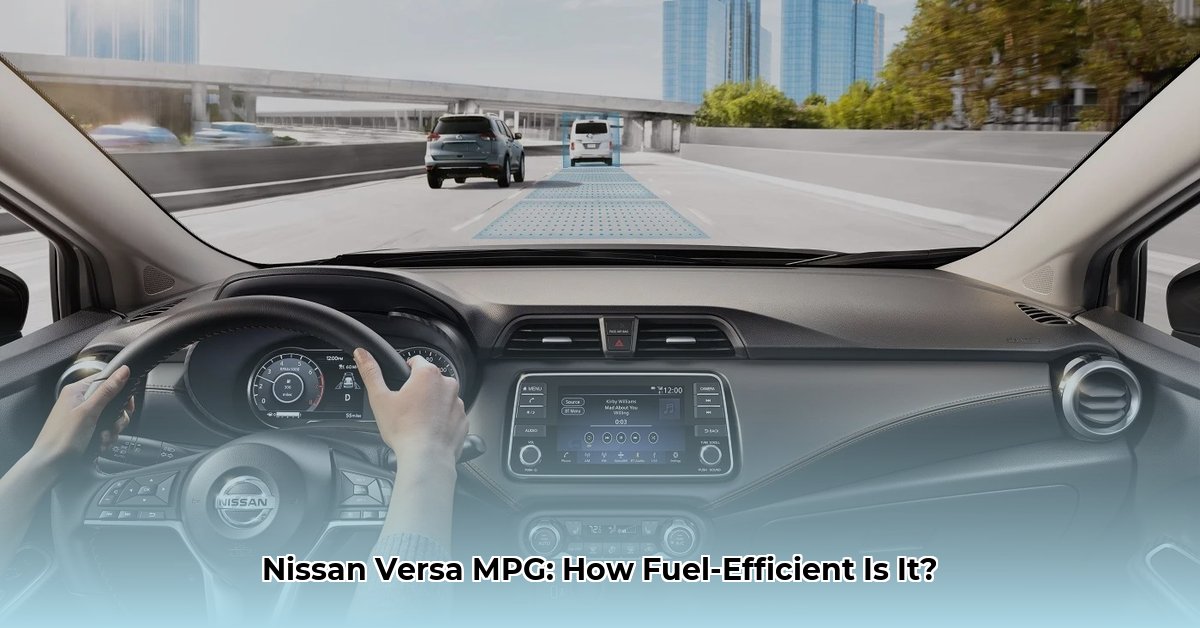Understanding Versa Fuel Efficiency
The Nissan Versa has earned a reputation for fuel efficiency. This guide provides a data-driven analysis of Versa MPG, spanning from 2007 to the latest models. We’ll examine EPA estimates, real-world driver data, and factors influencing fuel consumption. Whether you’re a current Versa owner or considering purchasing one, this guide offers valuable insights to help you maximize your mileage.
Versa MPG by Year and Transmission
This table presents EPA-estimated fuel economy figures for the Nissan Versa, categorized by model year and transmission type. These figures provide a baseline for comparison, but remember that real-world mileage can vary depending on driving conditions and individual habits.
| Model Year | Transmission | City MPG (EPA) | Highway MPG (EPA) | Combined MPG (EPA) |
|---|---|---|---|---|
| 2007 | Manual | 27 | 33 | 29 |
| 2007 | CVT | 28 | 34 | 30 |
| 2008 | Manual | 27 | 33 | 29 |
| 2008 | CVT | 28 | 34 | 30 |
| 2009 | Manual | 27 | 33 | 29 |
| 2009 | CVT | 28 | 34 | 30 |
| 2010 | Manual | 27 | 33 | 29 |
| 2010 | CVT | 28 | 34 | 30 |
| 2011 | Manual | 27 | 34 | 30 |
| 2011 | CVT | 28 | 36 | 31 |
| 2012 | Manual | 27 | 36 | 30 |
| 2012 | CVT | 28 | 37 | 32 |
| 2013-2014 | Manual | 27 | 36 | 30 |
| 2013-2014 | CVT | 30 | 37 | 33 |
| 2015-2016 | Manual | 26 | 35 | 29 |
| 2015-2016 | CVT | 31 | 40 | 35 |
| 2017-2019 | CVT | 31 | 39 | 34 |
| 2020-2023 | CVT | 32 | 40 | 35 |
Source: FuelEconomy.gov (Add specific links for each model year if desired.)
Real-World Versa MPG: Insights from Fuelly
While EPA estimates offer a standardized measure, real-world driving experiences often differ. Fuelly.com, a crowdsourced platform, provides valuable insights into the MPG Versa owners are actually achieving.
(Insert table or chart here using data from Fuelly.com. Clearly label it as crowdsourced data and include a disclaimer about potential variations.)
Remember, Fuelly data is user-submitted, so individual driving styles and conditions can significantly influence reported figures. Compare your own mileage to Fuelly data to see how your fuel efficiency aligns with other drivers.
Factors Influencing Versa Fuel Economy
Numerous factors contribute to your Versa’s fuel efficiency. Let’s explore some key influencers:
Transmission Type
CVTs generally deliver better fuel economy than manual transmissions in real-world driving due to their continuous gear ratio adjustments. However, individual driving habits still play a significant role.
Driving Habits
Aggressive acceleration and braking significantly reduce fuel economy. Consistent speeds and gradual acceleration/deceleration are key to maximizing MPG. City driving, with frequent stops and starts, typically yields lower MPG than highway driving.
Vehicle Maintenance
Regular maintenance is essential for optimal fuel efficiency. Properly inflated tires, clean air filters, and timely oil changes contribute to better gas mileage. Neglecting maintenance can negatively impact MPG.
External Factors
Weather conditions, such as cold temperatures or strong headwinds, can reduce fuel economy. Terrain also plays a role; hilly terrain requires more engine power, leading to lower MPG.
Versa Model Year and Trim Comparisons
The Versa has undergone updates over the years, impacting fuel economy. Newer models often incorporate improved engine and transmission technologies, potentially leading to increased MPG. While trim level differences don’t typically drastically affect fuel economy, variations in weight or features can have subtle impacts. Review specific model-year specifications on FuelEconomy.gov for precise details.
Versa vs. Competitors: Fuel Economy Showdown
How does the Versa’s fuel efficiency compare to its rivals? The table below compares the Versa to key competitors in its class, using combined EPA estimated MPG.
| Model | Combined MPG (EPA) |
|---|---|
| Nissan Versa | 35 |
| Honda Fit | Discontinued |
| Toyota Yaris | Discontinued |
| Kia Rio | 36 |
| Hyundai Accent | 36 |
| Chevrolet Spark | 33 |
| Mitsubishi Mirage | 39 |
Remember, these are EPA estimates. Real-world mileage can vary, and factors like driving habits and conditions play a significant role in actual fuel efficiency.
Maximizing Your Versa’s MPG: Tips and Tricks
Implement these strategies to boost your Versa’s fuel efficiency:
-
Maintain Correct Tire Pressure: Check tire pressure regularly and inflate to the recommended PSI.
-
Minimize Idling: Turn off your engine if idling for extended periods (except in traffic).
-
Drive Smoothly: Accelerate and brake gradually. Avoid aggressive driving.
-
Use Cruise Control (Highway): Maintain a consistent speed on highways using cruise control.
-
Adhere to Maintenance Schedule: Follow the recommended maintenance schedule in your owner’s manual. This includes regular oil changes, air filter replacements, and spark plug checks.
Troubleshooting Poor Gas Mileage
Experiencing lower-than-expected MPG? Consider these troubleshooting tips:
-
Check Engine Light: A check engine light can indicate issues affecting fuel economy. Get it diagnosed promptly.
-
Air Filter: A dirty air filter restricts airflow, reducing efficiency. Replace it as needed.
-
Tire Pressure: Under-inflated tires decrease MPG. Ensure tires are properly inflated.
-
Spark Plugs: Worn spark plugs can lead to incomplete combustion. Replace them as recommended in your owner’s manual.
-
Oxygen Sensor: A faulty oxygen sensor can disrupt the air-fuel mixture. Have it inspected if you suspect a problem.
FAQs: Common Versa Fuel Economy Questions
-
Q: Does using premium gas improve Versa MPG? A: No, the Versa is designed for regular gasoline. Using premium fuel offers no benefit.
-
Q: How accurate is Fuelly data? A: Fuelly data offers valuable real-world insights but is crowdsourced and subject to variations in reporting accuracy.
-
Q: Which Versa model year offers the best fuel economy? A: Refer to the EPA estimates table and Fuelly data to compare different model years. In general, more recent models tend to have slightly better fuel economy due to advancements in engine and transmission technology.
This guide provides a comprehensive overview of Nissan Versa fuel economy. Remember that individual driving experiences can differ, and real-world MPG is influenced by various factors. Stay informed, adopt fuel-efficient driving habits, and maintain your Versa properly to achieve optimal gas mileage.
- Windows App to Stop Apps Running in Background Saves Battery - February 2, 2026
- How To Spot Android Apps Running In The Background - February 1, 2026
- Android App to Stop Background Apps and Save Battery - January 31, 2026










